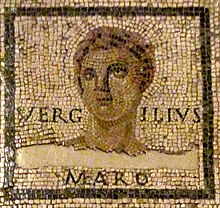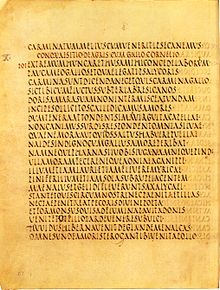Virgil
![]()
This article is about the Roman poet Vergil. For the Italian humanist named Vergil, see Polydor Vergil.
Publius Vergilius Maro, German usually Vergil, Late Antiquity and Middle Latin Virgilius and later in German also Virgil (* 15 October 70 BC near Mantua; † 21 September 19 BC in Brindisi) was a Roman poet and epic poet who lived during the period of the Roman Civil Wars and the Principate of Octavian (from 27 BC Augustus). He is considered the most important author of classical Roman antiquity and is a classic of Latin school reading. Along with Horace and Lucius Varius Rufus, with whom he belonged to the circle of Maecenas, as well as the elegists Cornelius Gallus, Properz and Tibull, Virgil may already have been counted among the best-known poets of "Augustan literature" among his contemporaries. His works, the Bucolica (Eclogues), the Georgica and the Aeneid and their thoughts revolutionized Latin poetry and were copied, edited, annotated and intertextually processed again and again shortly after his death.
The epic Aeneid provides the founding myth or the prehistory of the founding of the city of Rome by processing the mythological material from the Homeric epics Iliad and Odyssey. The Aeneid thus replaced the Annales of Quintus Ennius as the Roman national epic.

Depiction of Vergil in a mosaic from the 3rd century AD in Trier
Work
Catalepton (Appendix Vergiliana)
The Catalepton (Greek katá leptón: poems composed in a fine, delicate manner) are eighteen short poems (14 epigrams, three priapea, one sphragis) which, together with some epyllia, have been handed down repeatedly with Vergil's works (in the Appendix Vergiliana). The majority of these works are considered by many modern scholars not to have been written by Vergil. Whether individual poems of the corpus (namely Epigrams V and VIII) could not have been written by Vergil, the juvenile poet, is, however, disputed in judgment. These two poems apparently provide biographical information about Vergil's inclinations to turn away from rhetoric and move to the estate of the Epicurean Siro. However, a later epicureanism on Vergil's part, similar to that of his fellow poet Horace, is not evident from Vergil's works. The authenticity of the eighth epigram is disputed because the author there complains that Cremona, where Siro supposedly had his little estate, and Mantua were badly affected by the land confiscations of the civil wars. Already in the 1970s, the German classical philologist Heinrich Naumann pointed out, contrary to Büchner's opinion, among other things, that Vergil's circumstances had given him no reason to mourn Cremona and that he did not do so later (e.g. in the Bucolica).
The epyllia and doctrinal poems of the Appendix Vergiliana are consistently considered inauthentic by contemporary scholars. These are:
- The instructional poems Moretum ("The Herb Cheese Poem," peasant hand cheese recipe) and Aetna (on volcanism) [late 1st century BCE and mid-1st century CE, respectively],
- the curceps Culex ("The Mosquito") and Ciris ("The Heron") [14-37 AD],
- the dirae ("imprecations" of a peasant driven from his estate) [formerly principate],
- the two Elegiae ad Maecenatem [uncertain dating],
- the Copa ("landlady") (about a dancing Syrian landlady).
See also: Appendix Vergiliana.
Eklogen (Bucolica)
→ Main article: Eclogae
The Eclogues or Bucolica are a collection of ten pastoral poems by Virgil, written between about 43 and 39 BC. As a historical background, especially in the first and ninth eclogues, the land distributions of the years 42/41 after the defeat of Brutus and Cassius, the murderers of Caesar, appear, in which the discharged soldiers of the victors were settled on expropriated land in Italy. That Virgil's estate near Mantua had also been confiscated, but that he had been restituted his landed property by Octavian, was already inferred in late antiquity from the first poem (probably written in 40 B.C., according to Clausen only in 35 B.C.).
Georgica
→ Main article: Georgica
Soon Vergil belonged to the circle around Gaius Maecenas, one of Octavian's early allies, who later promoted poets like Vergil and Horace and helped them to prominence in Rome's influential circles. After the Eclogae were completed, Vergil worked from 37 to 29 B.C. on the Georgica ("On Agriculture"), dedicated to Maecenas.
Aeneid
→ Main article: Aeneid
Octavian, who had defeated Antony at the Battle of Actium in 31 BC and was given the title of "Augustus" by the Roman Senate four years later, is said to have urged Virgil to write an epic for the glory of his reign. Virgil's response was the Aeneid, which took up the last ten years of his life.

Vergil, Eclogae in the manuscript Vatican City, Biblioteca Apostolica Vaticana, Palatinus lat. 1631, fol. 15v ("Vergilius Palatinus", c. 500)
Name forms
Late antique folk etymology related the poet's name as Virgilius to the Latin virga, "rod." (A golden branch, also called virga in one place (Aeneid VI, 144), gives Aeneas access to the underworld in the sixth book of the Aeneid). The form Virgilius is in exclusive use in the Romance languages to this day, cf. French Virgile, Ital. and Span. Virgilio, portug. Virgílio. In German and English, older Virgil and newer Vergil, closer to classical antiquity, stand side by side. However, a few linguists also associated his name with the Latin vergalilius, meaning "the blessed one".
Search within the encyclopedia